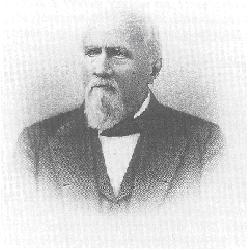
|
Home About This Site 'Gusta in the Wa'er Bibliography Contact Us
|
Gov. Charles Jones Jenkins
Augusta’s Defiant Governor Russell K. Brown
Charles Jones Jenkins was born in Beaufort, S. C. in 1805. His family moved to Georgia in 1816. He attended the University of Georgia for two years, then graduated from Union College, Schenectady, New York, in 1824. Jenkins opened a law practice in Augusta in 1829. He was elected to the state legislature in 1830, and was solicitor general of the middle judicial circuit and state attorney general from 1831 to 1834. He served in the assembly until 1850 and was speaker of the house for four terms.
In 1850 Jenkins drafted the so-called “Georgia Platform,” declaring southern cooperation with the federal government on issues related to extension of slavery in return for no northern violations of the Compromise of 1850. It was the policy of the south until the election of 1860.
Jenkins was invited to be a cabinet officer in the administration of President Millard Fillmore, but he declined. He ran unsuccessfully for governor in 1852 and held a state senate seat beginning in 1856. In 1860 Governor Joseph E. Brown appointed him a judge of the state supreme court, a position he held until the end of the Civil War.
Jenkins believed in the right of secession, but thought some overt act of aggression by the Republican administration in Washington was required as provocation. But when Georgia adopted an ordinance of secession in January 1861, he whole-heartedly supported it.
After the Civil War, Jenkins was a leader in the convention that drafted a new state constitution and he was elected governor in November 1865. The state was bankrupt and deeply in debt. Jenkins restored Georgia’s credit and financial condition within two years. He also advised the legislature not to ratify the Fourteenth Amendment to the U.S. Constitution, and tried unsuccessfully to get the U.S. Supreme Court to issue an injunction against the federal Reconstruction Act of 1867. When General George G. Meade, the military commander in Georgia, directed that the state pay $40,000 for another constitutional convention that recognized the federal requirements, Jenkins and state treasurer John Jones refused. Meade removed them from office in January 1868, replacing Jenkins with a Union general. Jenkins left Georgia, taking with him his official documents and the seal of the governor’s office, while Jones took $400,000 in state money to be deposited in an escrow account in a bank in New York.
Jenkins lived abroad for two years, returning to Augusta in 1870. When a Democratic governor and assembly were elected in 1872, Jenkins returned the removed items to his “first legitimate successor.” In response, he was presented a facsimile of the governor’s seal with the motto “In Arduis Fidelis” (Steadfast in Adversity). He was recognized in 1871 as a man “whom Georgia loves and esteems as one of her noblest sons.”
Jenkins served as president of yet another constitutional convention in 1877, but otherwise retired from public life. He died in Augusta June 14, 1883, and was buried in Summerville Cemetery with his two wives, Sarah Seaborn Jones (1806-1849) and Emily Gertrude Barnes (died 1882). Also buried there are the three children of his first marriage and the legal wards of his second wife (see the Augusta CWRT newsletter for July 2005).
Three of Jenkins’s Augusta homes have been identified. His Greene Street residence has been moved to Forest Hills and is now owned and occupied by our own Dr. Glen Owen. The governor’s other two houses, Green Court, on Cumming Road, and one on Johns Road, are displayed in Dr. Nell Callahan’s pictorial history of the historic Sand Hills community, Summerville.
References: |
| © 2007 John Rigdon |
